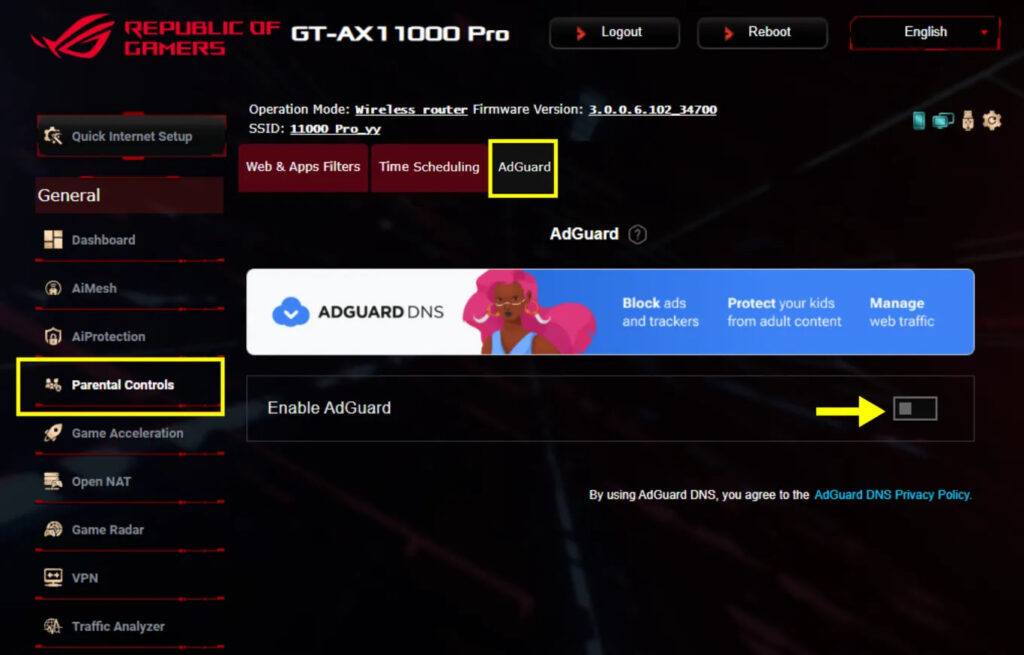
ASUS has announced the integration of AdGuard DNS as a built-in feature in its Wi-Fi 7-compatible routers, a move aimed at bolstering user security and privacy. The integration allows ASUS users to access AdGuard's ad-blocking and anti-tracking services at the router level, potentially reducing online threats and improving browsing experiences.
The decision to integrate AdGuard DNS comes amid growing concerns about online privacy and cybersecurity. However, the move also raises questions about the broader implications of DNS filtering at the hardware level and whether users will have sufficient control over their browsing data.
Wi-Fi 7 and built-in ad blocking
Wi-Fi 7 is the latest advancement in wireless networking, promising faster speeds, lower latency, and improved efficiency for high-bandwidth applications. ASUS’ integration of AdGuard DNS brings an additional security component to these high-speed networks, aiming to prevent unwanted tracking and intrusive advertising. The key benefits of this combo are summarized as follows:
- Ad and tracker blocking – Filters out ads and tracking scripts at the DNS level, potentially improving browsing speed and reducing exposure to intrusive tracking.
- Malware and phishing protection – Blocks access to harmful websites, though questions remain on the extent and accuracy of this filtering.
- Parental controls – Allows users to restrict access to certain types of content, though critics argue that over-blocking could be a concern.
- Network-wide implementation – Unlike device-level ad blockers, this DNS-based approach applies to all connected devices automatically, but users may have limited customization options.
For now, only seven ASUS routers support this new feature, however, more models are expected to be added in the future. These are ROG Rapture GT-BE98 Pro, ROG Rapture GT-BE19000, ROG Rapture GT-BE25000, ROG Rapture GT-BE98, RT-BE96U, RT-BE88U, ROG USB-BE92.
While the feature could enhance online privacy, users should consider the trade-offs, including potential reliance on AdGuard’s filtering lists and limited transparency regarding blocked content.

AdGuard
The scourge of online ads
State-sponsored spyware campaigns have used online advertising as a distribution method. A 2023 investigation by Haaretz exposed how cyber firms exploit online ad networks to deploy spyware targeting activists, journalists, and political opponents. The report pointed to a lack of effective ad moderation by major tech companies such as Google, Apple, and Microsoft, leaving users vulnerable to these attacks.
Online advertising systems, which rely on real-time ad bidding, have become a vector for malware distribution in the past years, and Google appears unable to tackle the problem. Given the increasing sophistication of these attacks, ad-blocking solutions, including DNS-level blocking, are seen as a necessary countermeasure.
To activate or not?
Users can activate AdGuard DNS through their router’s admin panel by selecting it under DNS settings. However, they should evaluate whether this system aligns with their specific needs, as some users may prefer greater control over their DNS filtering options.
While ASUS’ integration of AdGuard DNS reflects a growing emphasis on privacy and security, it also raises questions about centralized ad filtering and the role of hardware manufacturers in online content moderation. As the digital landscape continues to evolve, users must weigh the benefits of enhanced security against potential limitations in browsing freedom and data control.







Leave a Reply